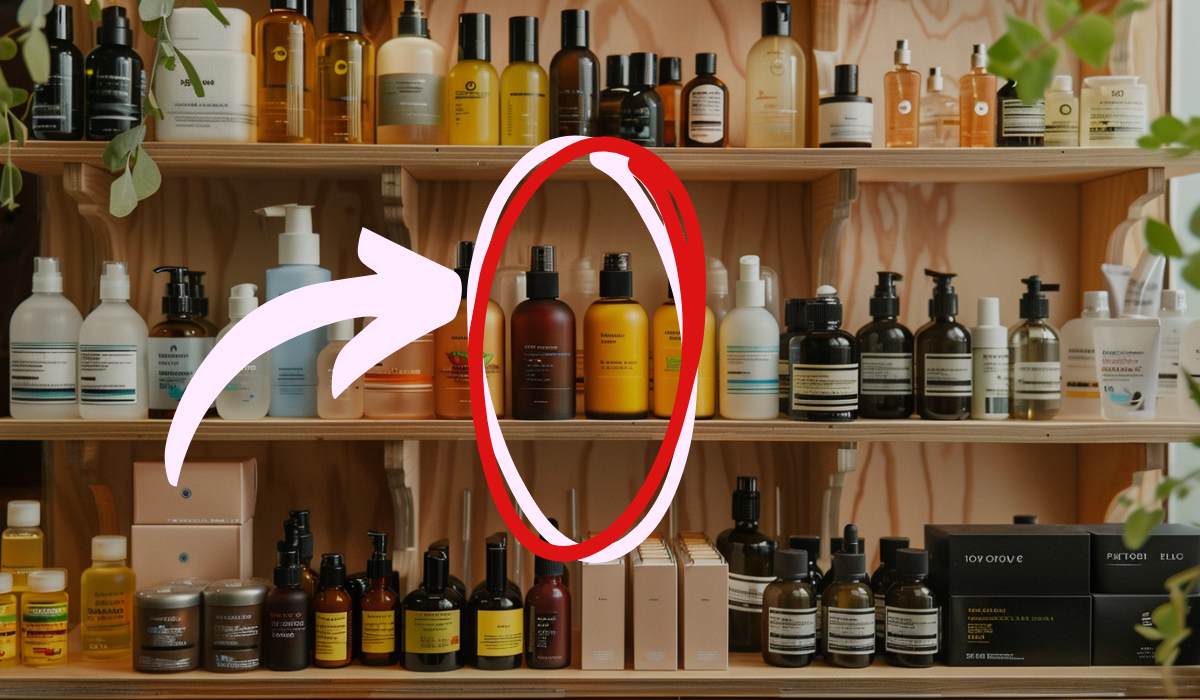The Worst Ingredients for Sensitive Skin
Have sensitive skin?
Then, yes, I’d say you need to be careful.
As a certified skincare formulator I feel it is my job to educate my readers when it comes to the ingredients that you need to be aware of.
So check my comprehensive list below and take notes.
36. Fragrances (both artificial and natural)
Oh, fragrances can be a bit of a troublemaker for sensitive skin. Yes, they can cause irritation or allergic reactions.
You’ll find them lurking in all sorts of products – from your favourite perfume to that “unscented” lotion you thought was safe… In fact, they pop up in soaps, shampoos, moisturisers, and even some makeup.
Check the label and spot the word “fragrances” somewhere in there. You will find it more often than not.
SOLUTION: Look for products that proudly declare themselves “fragrance-free” (not just “unscented”, as that can be tricky!). Keep an eye out for labels that say “no added fragrance” too. When you’re shopping scan those ingredient lists – steer clear of anything mentioning “parfum”, “fragrance”, or “aroma”. Products made specially for sensitive skin are often your best bet. They will be gentle and usually skip fragrances and other bothersome ingredients.
35. Essential oils (even in natural products)
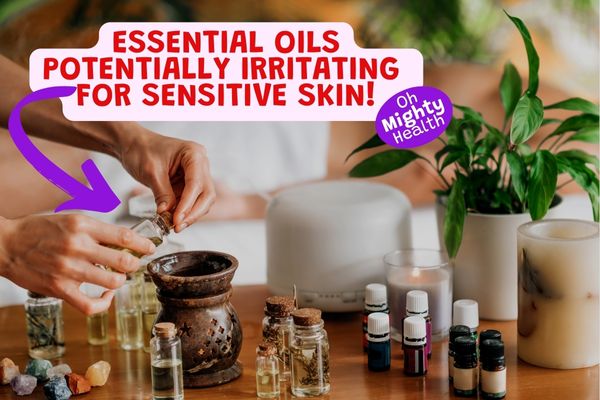
While they sound natural and lovely, essential oils can be quite potent and irritating for sensitive skin. These concentrated plant extracts are found in many “natural” skincare products, aromatherapy items, and even some cleaning products.
SOLUTION: To keep your sensitive skin happy, try to avoid products with essential oils listed in the ingredients. Instead, look for gentler, fragrance-free alternatives. Remember, natural doesn’t always mean skin-friendly!
34. Alcohol (especially in toners and cleansers)
Alcohol in skincare is often used to make products feel lighter or dry quickly, but it can leave your skin feeling tight and irritated.
You’ll find alcohol lurking in many toners, cleansers, and even some moisturisers.
SOLUTION: To keep your skin feeling comfortable, look for alcohol-free products or ones that list gentler alcohols (like cetyl or stearyl alcohol).
33. Sulfates (common in foaming products like shampoo)
Sulfates (e.g., Sodium Lauryl Sulfate, Sodium Laureth Sulfate) are sometimes too harsh for sensitive skin. They can strip away natural oils, leaving your skin feeling dry and irritated.
These foaming agents are common in shampoos, body washes, and facial cleansers.
SOLUTION: For a gentler cleanse, look for sulfate-free products or those with milder cleansing agents like coco betaine, coco glucoside or decyl glucoside.
32. Parabens (check ingredient names ending in “-paraben”)
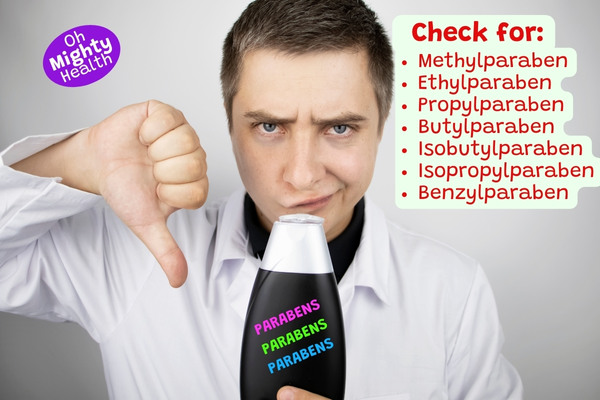
Some people find parabens irritating, and there are also concerns about their long-term effects.
You’ll spot parabens in many cosmetics and skincare products. Their names usually end in “-paraben” (like methylparaben or butylparaben). See the list below.
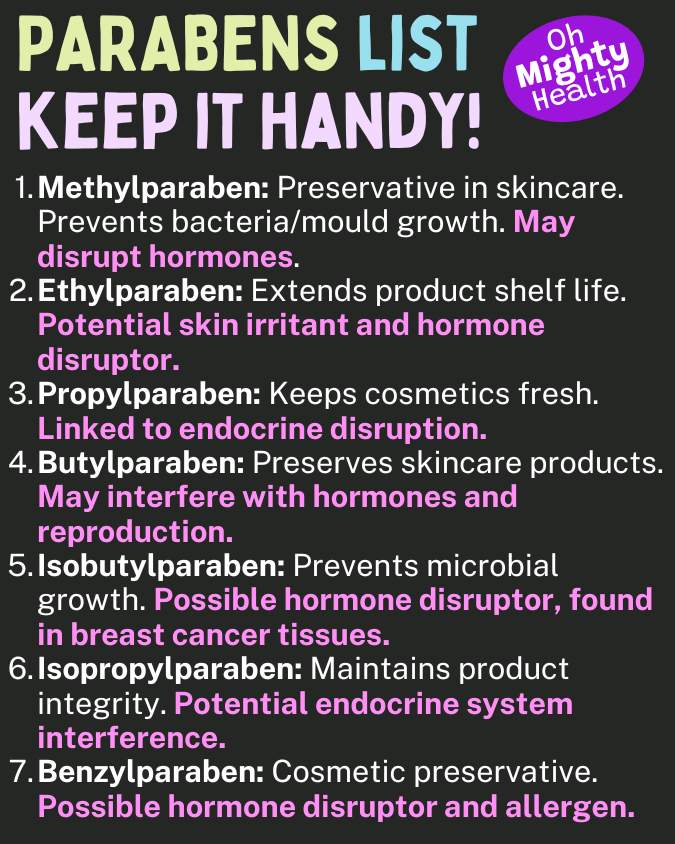
SOLUTION: If you’re worried, look for “paraben-free” products or those using alternative preservatives. Natural preservatives are much better, I use them in my formulations, particularly Geogard 221 (Cosgard).
31. Formaldehyde (including ‘releasing’ preservatives)
Formaldehyde might trigger irritation or allergic reactions in some people.
Watch out for ingredients like DMDM hydantoin, imidazolidinyl urea, or quaternium-15 in your personal care products.
SOLUTION: Go for products that use gentler preservatives (as mentioned in the section above) or are labelled “formaldehyde-free”.
30. Propylene glycol (in many moisturisers)
Propylene glycol is a bit of a jack-of-all-trades in skincare, helping products stay moist and absorb better. Recently they’ve created one derived from vegetable oils. But for sensitive skin, it can sometimes cause irritation.
You’ll find this ingredient in many moisturisers, sunscreens, and even some foods and medicines.
SOLUTION: If your skin is super sensitive, check the label to make sure the ingredient is not there.
29. Lanolin (often in lip products)
Lanolin, derived from sheep’s wool, is often touted as a natural moisturiser. However, for some with sensitive skin, it can be more of a wolf in sheep’s clothing, causing allergic reactions or irritation. I’m vegan so wouldn’t use it anyway, but it is good that you know you need to be aware of possible irritations.
It’s commonly found in lip balms, nipple creams, and rich moisturisers.
SOLUTION: If you suspect lanolin might be bothering your skin, keep an eye out for “lanolin-free” products or those using alternative emollients like shea butter or jojoba oil, which I adore.
28. Mineral oil (can trap other irritants)
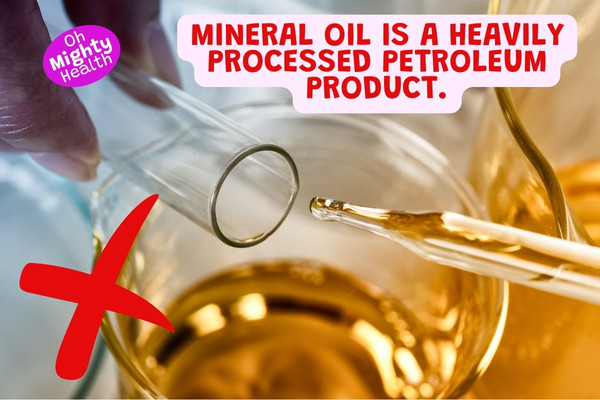
Mineral oil sits on top of your skin, potentially trapping other ingredients underneath and it can sometimes lead to clogged pores or irritation for sensitive skin.
You’ll often spot mineral oil in body lotions, baby products, and some facial moisturisers.
SOLUTION: If you’re worried, look for products that use plant-based oils instead, like sunflower or safflower oil.
27. Phthalates (often hidden in ‘fragrance’)
Phthalates are sneaky little chemicals often used to help fragrances stick around longer or to make plastics more flexible. Some people worry they might disrupt hormones or irritate sensitive skin.
These compounds are found in many personal care products, especially those with fragrances.
SOLUTION: Look for “phthalate-free” labels if you’re concerned, and remember that fragrance-free products are less likely to contain them.
26. Cocamidopropyl betaine (in ‘gentle’ cleansers too)
This ingredient is a gentle cleansing agent, which sounds great (and I’ve used it many times in my homemade shower gel). However, for some sensitive skin types, it can still be irritating. Let’s put it this way: it’s a bit like a well-meaning friend who sometimes says the wrong thing.
I recently have moved to coco betaine to be on the safe side (I don’t have sensitive skin but I need to take care of my clients’ skin so I prefer to play it safe).
SOLUTION: You’ll find this ingredient in many “gentle” or “baby” shampoos and body washes. If you suspect it’s causing issues, look for products that use even milder cleansing agents or stick to simple, soap-free cleansers.
25. Retinoids (in high concentrations)
Retinoids can be too strong for sensitive skin. People think they’re fantastic for fighting signs of ageing, but I prefer to use “bakuchiol” (the natural version, it is a wonderful ingredient!). Retinoids can cause irritation, redness, and flaking, especially in higher concentrations. Please don’t fall for traps when it comes to skincare fads. We’ve all done “The Ordinary” 10-step or whatever routine but not only this is NOT necessary, you are probably applying too many ingredients onto your skin all at once! (meaning in one session). I used to and I can see now it was just me “following trends” and whatever I was told.
Nowadays I know better. My skincare routine is SIMPLE, NATURAL and doesn’t not employ ANY harsh, strong or synthetic ingredients. Please do check Bakuchiol if you’re interested in Retinoids.
SOLUTION: You’ll find retinoids in anti-ageing creams, serums, and acne treatments. If you want to try them, look for Bakuchiol as mentioned above. if you still want to try retinoids, go for gentler forms like retinyl palmitate, or start with very low concentrations and gradually build up your skin’s tolerance.
24. Glycolic acid and other alpha-hydroxy acids (AHAs) – (can increase sun sensitivity)
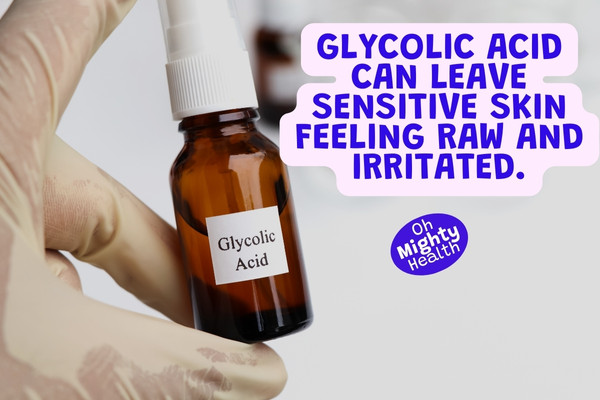
AHAs are great at sloughing off dead skin cells, but can sometimes leave sensitive skin feeling raw and irritated.
These acids are common in chemical exfoliants, anti-ageing products, and some acne treatments…
SOLUTION: If you want to use AHAs, start with gentler options like lactic acid, or look for products with very low concentrations.
23. Salicylic acid and other beta-hydroxy acids (BHAs) – (may be drying)
BHAs, like salicylic acid, are oil-soluble exfoliants that can really go deep into pores. While they’re good at clearing out gunk, they can sometimes be a bit harsh for sensitive skin.
You’ll find BHAs in acne treatments, some exfoliating toners, and products for oily skin.
SOLUTION: If you want to try them, look for lower concentrations or products that combine BHAs with soothing ingredients.
22. Benzoyl peroxide (can bleach fabrics)
Benzoyl peroxide is like a tough-love acne fighter. It’s great at killing bacteria that cause spots, but it can be quite drying and irritating, especially for sensitive skin.
This ingredient is common in over-the-counter acne treatments.
SOLUTION: If you need to use it, start with lower concentrations and apply it sparingly. You might also want to try gentler acne-fighting ingredients like tea tree oil or niacinamide.
21. Chemical sunscreens (can penetrate skin)
Chemical sunscreens work by absorbing UV rays, which is supposedly great for sun protection but can sometimes irritate sensitive skin.
SOLUTION: If they bother your skin, look for natural sunscreens instead, which use ingredients like zinc oxide or titanium dioxide to reflect UV rays away from your skin.
20. Dyes and artificial colourants (unnecessary additives)
Dyes and colourants don’t really do anything beneficial for your skin. I despise them to be honest. It’s one of those things that I feel makes people believe that a “pretty” product will work better. But it is harmful and we should not buy these marketing tactics. And, for sensitive types, they can be downright irritating.
You’ll find dyes and colorants in all sorts of cosmetics, from eyeshadows to tinted moisturisers. Argh!!
SOLUTION: If you’re concerned at best or angry as I am when it comes to these unnecessary additives, look for products that proudly proclaim they’re “dye-free” or stick to products with natural colours from ingredients like fruit extracts.
19. Methylisothiazolinone and methylchloroisothiazolinone (common in liquid products)
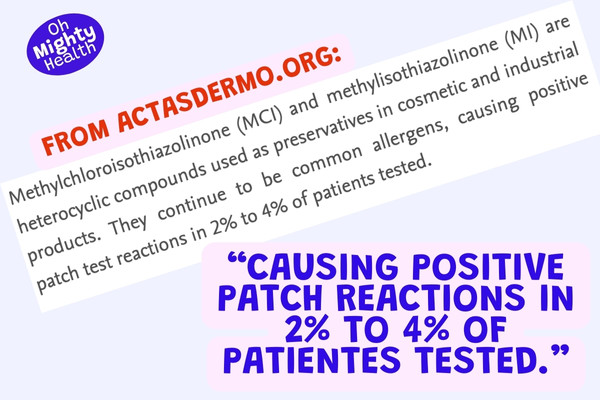
These preservatives can be harsh and are known to cause allergic reactions in some people. Read the image above, the quote is from a reputable source.
You might spot these in liquid personal care products like shampoos, liquid soaps, and some moisturisers.
SOLUTION: If you’re worried, look for products that use gentler preservatives or are labelled “MI/MCI-free”.
18. Urea (fine in small amounts)
In low concentrations, urea can be a great moisturiser, but in higher amounts, it can irritate sensitive skin. I love it and use it in my formulas, but you might want to be careful with it if you have sensitive skin.
You’ll find urea in many moisturisers, especially those for very dry skin.
SOLUTION: If you have sensitive skin, look for products with low concentrations of urea or avoid it altogether.
17. Witch hazel (often contains alcohol)
Witch hazel is often touted as a natural astringent, but it can be a bit too drying for sensitive skin. It’s like using a super-strong paper towel on a delicate surface – it might get the job done, but at what cost?
This ingredient is common in toners and products for oily skin.
SOLUTION: If it bothers your skin, look for gentler, alcohol-free toners or try a simple micellar water instead. There is also alcohol-free witch hazel, not easy to find, here’s the one I recommend.
16. Menthol (can cause stinging)
Menthol gives that cool, tingly feeling that some people love, but for sensitive skin, it can be more irritating than refreshing.
You’ll find menthol in some cleansers, aftershaves, and “cooling” products.
SOLUTION: If you have sensitive skin, it’s usually best to avoid products with menthol and simply choose gentler, soothing ingredients instead.
15. Eucalyptus (potent essential oil)
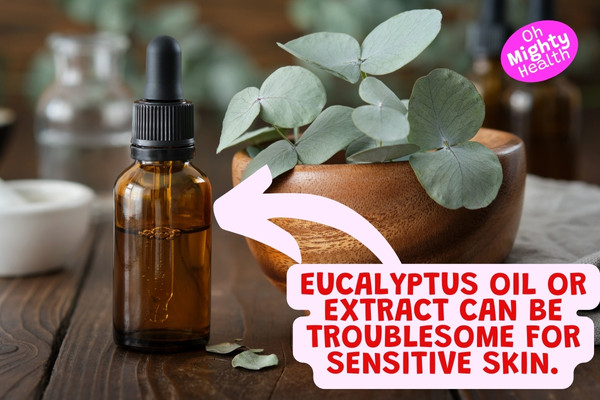
Eucalyptus is often used for its refreshing scent and potential antiseptic properties, but it can be quite potent and irritating.
You’ll find eucalyptus in some natural skincare products, aromatherapy items, and cold remedies.
SOLUTION: If you have sensitive skin, it’s usually best to steer clear of products containing eucalyptus oil or extract.
14. Peppermint oil (may increase sensitivity)
Like eucalyptus, peppermint oil can be potentially harsh for sensitive skin. It can cause a cooling sensation that might unfortunately lead to irritation or even a burning feeling for some people.
Peppermint essential oil can easily pop up in lip balms, foot creams, and some “invigorating” facial products.
SOLUTION: If you have sensitive skin, look for gentler alternatives without added fragrances or essential oils.
13. Cinnamon (potential allergen)
Cinnamon might be delightful in your latte, but it’s not always so nice on sensitive skin. It can cause irritation or even allergic reactions in some people when used topically.
You might find cinnamon in some “warming” masks or natural skincare products.
SOLUTION: If you have sensitive skin, it’s best to avoid products with cinnamon and go for gentler, soothing ingredients instead.
12. Citrus extracts and oils (increase sun sensitivity)
Citrus ingredients might sound refreshing, but they can be problematic for sensitive skin. They can cause irritation and increase sun sensitivity.
Citrus extracts and oils are common in brightening products, “refreshing” cleansers, and products claiming to have vitamin C.
SOLUTION: If you have sensitive skin, look for gentler forms of vitamin C (like sodium ascorbyl phosphate) and avoid products with citrus oils or extracts.
11. Sodium hydroxide (lye – in some bar soaps)
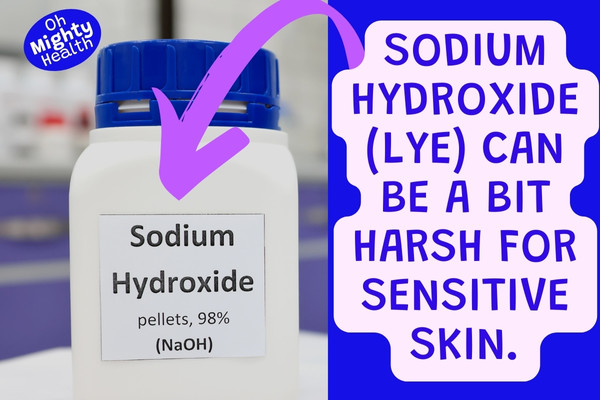
Sodium hydroxide, also known as lye, is used to adjust the pH in many products. But it can be harsh for sensitive skin.
This ingredient is found in some soaps, hair relaxers, and pH-adjusting products. While it’s usually neutralised in the final product, very sensitive skin might still react.
SOLUTION: Look for products with gentler pH adjusters or those specifically formulated for sensitive skin.
10. Triclosan (antibacterial ingredient)
Triclosan kills bacteria and it might be too harsh for sensitive skin. Plus, there are concerns about its long-term effects on health and the environment.
You might find triclosan in antibacterial soaps, some toothpastes, and certain cosmetics.
SOLUTION: Many companies are phasing it out, but if you’re concerned, look for products labelled “triclosan-free” or stick to gentle, regular soaps.
9. Benzyl alcohol (multiple functions in products)
Benzyl alcohol can act as a preservative, fragrance, or solvent. While it’s considered gentler than some alcohols, it can still irritate sensitive skin.
This ingredient shows up in many personal care products, from shampoos to moisturisers.
SOLUTION: If you find it bothers your skin, look for products that use alternative preservatives.
8. Hydroquinone (in skin-lightening products)
Hydroquinone is potentially irritating, especially for sensitive skin. There are also concerns about its safety with long-term use.
You’ll find hydroquinone in some skin-lightening products and treatments for dark spots.
SOLUTION: If you’re concerned, look for gentler alternatives like kojic acid, vitamin C, or niacinamide. Check out my article on my top natural solutions for hyperpigmentation.
7. Talc (potential asbestos contamination)
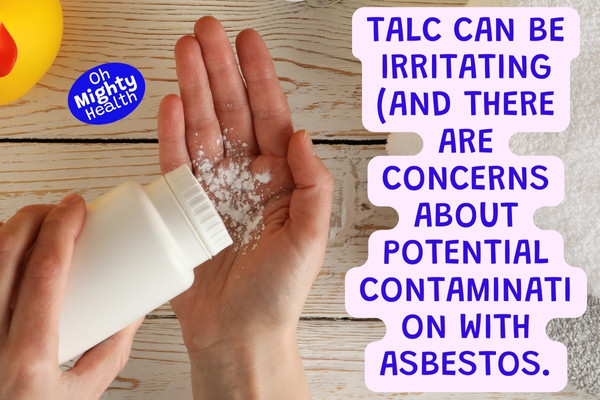
Talc absorbs moisture and has been popular for many, many years. However, some people find it irritating, and there are concerns about potential contamination with asbestos.
Talc is common in powder makeup products, baby powder, and some body powders.
SOLUTION: If you’re worried, look for talc-free alternatives or products using corn starch or rice powder instead.
6. Petrolatum (occlusive, may trap irritants)
Petrolatum, or petroleum jelly, is literally like a waterproof coat for your skin. It locks in moisture and it can be too heavy or pore-clogging, especially those with sensitive or acne-prone skin.
You’ll find petrolatum in many lip balms, heavy moisturisers, and ointments.
SOLUTION: Look for products with plant-based oils or butters instead (shea butter, cocoa butter, or oils like coconut oil, etc).
5. Synthetic dyes (look for FD&C or D&C)
Synthetic dyes are like the artificial food colouring of the skincare world 🙁 They don’t offer any skin benefits and can irritate sensitive skin.
You’ll spot these in many coloured cosmetics, from eyeshadows to lipsticks.
SOLUTION: Look for products that use natural pigments instead. Go for for dye-free options if you’re concerned.
4. Mica (in some cases – in shimmery products)
Mica is the glitter in make up. It is generally considered safe, but some people with very sensitive skin might find the tiny particles irritating.
Mica is common in shimmery makeup products like eyeshadows and highlighters.
SOLUTION: If it bothers your skin, look for matte products or those using alternative shimmer ingredients that are 100% non-irritating.
3. Nanoparticles (deeper skin penetration)
Nanoparticles are very small and they can penetrate deeper into the skin, which might be concerning for sensitive types.
You’ll find nanoparticles in some sunscreens and anti-ageing products.
SOLUTION: If you’re worried, look for products that specifically state they’re “non-nano” or stick to traditional formulations.
2. Dimethicone (for some individuals, silicone-based ingredient)
Dimethicone is used to help products glide on easily (and can fill in fine lines). However, it can be pore-clogging or irritating.
This ingredient is common in many moisturisers, primers, and foundations.
SOLUTION: If it doesn’t agree with your skin, look for silicone-free or natural formulations.
1. Isopropyl myristate (potentially pore-clogging)
Isopropyl myristate helps other ingredients penetrate the skin and it’s supposed to give products a smooth feel. It can be comedogenic and irritating.
You might find this in creamy products like lotions and some makeup.
SOLUTION: Look for products that use alternative emollients or are labelled “non-comedogenic”.
Now, that’s was a comprehensive list!
Ok! That completes my comprehensive list of potentially problematic ingredients for sensitive skin.
Remember, everyone’s skin is unique, so what bothers one person might be fine for you.
It’s always best to patch test new products and consult with a dermatologist if you’re unsure!
Let me know if I missed any.

